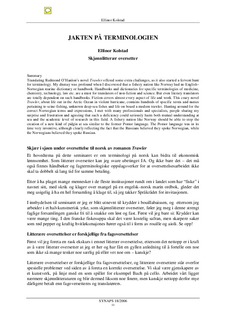Jakten på terminologien
Journal article
Permanent lenke
http://hdl.handle.net/11250/2406086Utgivelsesdato
2006Metadata
Vis full innførselSamlinger
Originalversjon
SYNAPS - A Journal of Professional Communication 18(2006) pp.11-18Sammendrag
Translating Redmond O’Hanlon’s novel Trawler offered some extra challenges, as it also started a fervent hunt
for terminology. My dismay was profound when I discovered that a fishery nation like Norway had no English–
Norwegian marine dictionary or handbook. Handbooks and dictionaries for specific terminologies of medicine,
chemistry, technology, law etc. are a must for translators of non-fiction and science. But even literary translators
are totally dependent on such handbooks. Fiction covers almost every aspect of life and work. This crazy novel
Trawler, about life out in the Arctic Ocean in violent hurricane, contains hundreds of specific terms and names
pertaining to seine-fishing, unknown deep-sea fishes and life on board a modern trawler. Hunting around for the
correct Norwegian terms and expressions, I met with many professionals and specialists, people sharing my
surprise and frustration and agreeing that such a deficiency could seriously harm both mutual understanding at
sea and the academic level of research in this field. A fishery nation like Norway should be able to stop the
creation of a new kind of pidgin at sea similar to the former Pomor language. The Pomor language was in its
time very inventive, although clearly reflecting the fact that the Russians believed they spoke Norwegian, while
the Norwegians believed they spoke Russian.
Beskrivelse
This article is in Norwegian.
